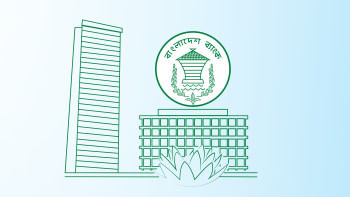Landlords' decree
The fixed income city dwellers comprising both middle and lower middle class households are in real trouble to tackle the rising house rent in the country. Most landlords, in the recent years, have increased their rentals on the plea of increase in prices of the essential commodities, construction materials, holding tax and cost of the utility services.
House rent has increased nearly 285 per cent during the last 18 years, according to a survey conducted by the Consumers Association of Bangladesh (CAB). A jump of over 23 per cent in house rent was witnessed in 1991 and the trend continued later on. It was increased by 17.4 per cent in 2001, 13.49 per cent in 2002, 8.4 per cent in 2003, 9.96 per cent in 2004, 7.89 per cent in 2005 and 14.14 per cent in 2006. Further, it has been increased by 21.48 per cent only in 2007.
On an average, nearly 50 per cent of monthly income of a household is spent on house rent. However, ideally it should not exceed 20 per cent of income of any household.
The fixed and low income households are the worst sufferers affected by the frequent increase in house rent. But there is no control of house rent in absence of effective government measures. There is absolutely no authority to monitor the growth of house rent. Also there is no effective law to protect the rights of the tenants. In the website of DCC, monthly house rent rate of 10 different zones are shown, but these are not implemented on ground.
Rent controller system was first introduced in this subcontinent during British rule. The Rent Control Act was enacted for the first time in 1943. It was amended in 1953 in the then East Pakistan. As a continuation to this, the latest amendment was made back in 1991, which is known as Premises Rent Control Act 1991. There are 36 sections in this act.
As per the law, house rent should be assessed at 15 per cent of the total cost of land and construction for a premise, which is in fact ignored in most of the cases.
The law also says that the landlord cannot increase the rent unless the house has been remodelled or renovated. Increase of house rent should not be based on only cost of land and construction of house, but should also include the depreciation value of the house. It should be determined on the basis of location, space, amenities and present market price; and also separately for commercial and residential areas.
In India, house rent is charged based on standard provision devised by the local authority. In Delhi it is to be maximum 10 per cent of construction cost and market price of land based on historical values, not as per current market value. The rent also decreases according to the life of property. In Pakistan it is practiced as per mutual agreement of both landlords and tenants at the interval of every three years of tenancy.
In the USA, the Neighbourhood Councils settle any dispute related to house rent between landlords and tenants following the process of alternative dispute resolution (ADR). Those Councils act as innovative forums for all community stakeholders as quasi city entities that affect the lives of the citizen.
Here the existing laws related to house rent contain lot of inconsistencies in terms of implementations. Both landlords and tenants are ignorant about the law in general. The law is biased towards the landlords in particular. The tenants are vulnerable to various exploitations by the landlords in absence of an effective rent control mechanism.
We urge the government to take necessary action against the greedy landlords.

 For all latest news, follow The Daily Star's Google News channel.
For all latest news, follow The Daily Star's Google News channel. 



Comments